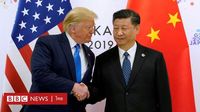As tensions escalate between the United States and China, the implications for the global economy are becoming increasingly significant. President Donald Trump's recent threats to impose tariffs exceeding 100% on Chinese imports starting April 9, 2025, have raised alarms among economists and trade analysts. The Chinese government has vowed to resist what it perceives as coercive tactics from the U.S., stating that they will "fight to the end" rather than submit to U.S. pressure.
The trade relationship between the two economic superpowers is enormous, valued at approximately $585 billion in 2024. However, the U.S. imports significantly more from China, totaling about $440 billion, compared to its exports to China, which stand at around $145 billion. This has resulted in a trade deficit of $295 billion for the U.S., equivalent to about 1% of its GDP. While Trump has often cited a $1 trillion trade deficit, analysts argue that the actual figure is much lower.
Since Trump first imposed tariffs during his presidency, the U.S. has seen a reduction in its reliance on Chinese imports. In 2016, 21% of all U.S. imports came from China; by 2024, this figure had dropped to 13%. However, many analysts believe that Chinese goods are now being routed through Southeast Asian countries like Malaysia, Thailand, Cambodia, and Vietnam to circumvent these tariffs. The U.S. Department of Commerce has indicated that some Chinese solar panel manufacturers have relocated their operations to avoid tariffs, further complicating the trade landscape.
Looking ahead, the types of goods exchanged between the U.S. and China are critical to understanding the potential impact of heightened tariffs. In 2024, the most significant exports from the U.S. to China included soybeans, primarily used for pig feed, alongside pharmaceuticals and petroleum. Conversely, China exports a vast array of electronic products, computers, and toys to the U.S., with mobile phones representing 9% of all U.S. imports from China. This relationship has already affected major U.S. companies, with Apple seeing a 20% drop in its market value in the past month due to fears over increased tariffs.
If tariffs on Chinese goods were to rise to 100%, the impact on American consumers could be severe, with prices expected to rise significantly. The tariffs currently in place have already increased prices by about 20%, and further increases could multiply this effect fivefold. Moreover, retaliatory tariffs from China would also raise prices on American goods, ultimately hurting consumers on both sides.
Beyond tariffs, both nations may employ other strategies to undermine each other's economies. China plays a pivotal role in supplying essential metals for industries, including lithium and rare earth elements. The Chinese government could restrict the export of these materials to the U.S., a tactic previously used with germanium and gallium, both critical for U.S. military technology. On the flip side, the U.S. has increasingly limited the export of advanced microchips to China, a move that has intensified under President Biden.
As the trade war unfolds, the ramifications extend beyond the U.S. and China, potentially affecting global economic stability. Together, these two nations account for approximately 43% of the global economy, according to the International Monetary Fund. A full-scale trade war could slow growth and push other countries into recession, as global investments would likely be impacted.
Thailand, in particular, finds itself at a crossroads. The country has exported around $4.4 billion worth of goods to China, while imports from China stand at approximately $1.45 billion. The trade surplus with China is expected to reach about $2 billion if handled properly. However, the rising tariffs could significantly alter this dynamic, with experts warning that Thailand's exports to China could drop by as much as 10% if tariffs increase.
Amorntep Chavalit, Assistant Managing Director at CIMB Thai Bank, highlighted the importance of focusing on non-tariff barriers that could emerge from Trump's policies. These barriers could include restrictions on products such as automobiles, steel, and pharmaceuticals. He emphasized that the U.S. is shifting towards a self-reliant economy, which could further complicate Thailand's trade relations.
Chavalit metaphorically described the U.S. and China as "Siamese twins"—interconnected and reliant on one another. He posited that if the U.S. seeks to decouple from China, it would require significant adjustments that could harm both economies. He noted that while the U.S. GDP grows at about 2% annually, China’s growth rate is around 4%, suggesting a potential shift in global economic dominance within the next decade.
Furthermore, the ASEAN region, of which Thailand is a part, could face severe repercussions from these trade tensions. Many ASEAN countries are already experiencing high tariffs imposed by the U.S. As Thailand acts as a conduit for Chinese goods entering the U.S. market, the country must not only focus on export figures but also on the true value added by its domestic production.
Chavalit warned that while Thailand's export figures may appear robust, the reality is that many products simply pass through the country without creating significant local value. He identified three critical areas that Thailand must navigate: managing the influx of Chinese goods, adapting to U.S. economic fluctuations, and ensuring that domestic production remains competitive.
In summary, as the U.S. and China continue to engage in a high-stakes trade conflict, the ramifications for Thailand and the broader global economy are profound. Economists are watching closely, as the outcome of these tensions could redefine trade relationships and economic strategies worldwide.





